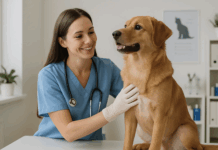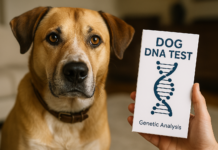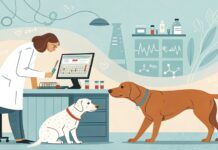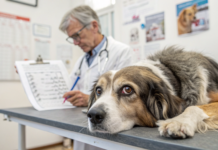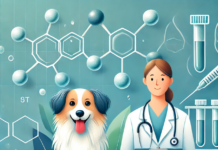Last Updated on March 15, 2022 by Dogs Vets
Can Dog Eat Eggs?
Many pet owners wonder which “human foods” are appropriate for their pets. A question I am often asked by pet parents at my veterinary clinic is, “Can dogs eat eggs? The question is, “Can dogs eat eggs?
Here’s everything you need to know about the nutritional value of eggs for dogs.
How Are Eggs Good for Dogs?
Eggs are rich in protein, fatty acids, and amino acids that are beneficial to the dog’s body. They are also a healthy snack that can help treat upset stomachs.
The shell can be a good source of calcium. While not intended to replace a dog’s primary protein source, eggs are an excellent supplement and sometimes a treat.
Other beneficial nutrients found in eggs include vitamins A and B12, riboflavin, folate, iron, and selenium.
How Bad Are Eggs for Dogs?
Any good food is only good in the proper moderation. Eggs can be high in cholesterol and if consumed in large enough quantities obesity can take effect in the long term, and they can also cause stomach upset in the short term.
Most dogs should not be fed more than two full eggs per day, and a healthy serving size for your individual dog should be determined by your veterinarian or professional nutritionist.

Some veterinarians may be concerned about salmonella in uncooked eggs, which is a common cause of death in dogs. In general, dogs with normal immune systems will not get sick from salmonella infections, but dogs with compromised immune systems may be more at risk.
Cooking eggs reduces the risk of salmonella infection, but some vets say that cooking eggs lose their nutritional value. You should discuss these topics with your own vet.
Egg whites contain avidin. Avidin inhibits biotin, a vitamin that is essential for cell growth, metabolism, and healthy skin in dogs. Long-term exposure to avidin can cause biotin deficiency.
However, egg yolks are very high in biotin and can compensate for any deficiency caused by egg whites.
Your dog would have to eat large amounts of egg whites for a long time to suffer from biotin deficiency, however, cooking the eggs would reduce this risk.
Again, some veterinarians warn that some of the health benefits are lost when eggs are cooked.
As with all foods, there is a risk that eggs can cause mild gastrointestinal upset and allergic reactions. In rare cases, food allergies can lead to anaphylaxis, a potentially life-threatening condition.
If you notice any signs of an allergic reaction such as sneezing, coughing, swelling, hives, or difficulty breathing, stop feeding your dog eggs and contact your veterinarian.
Are Eggs Good for Dogs? Can Dogs Eat Boiled Eggs?
The answer is yes, cooked eggs are good for dogs! Dogs can eat boiled eggs or scrambled eggs. Dogs can eat boiled or scrambled eggs. The main purpose is that the eggs need to be cooked. Do not feed raw eggs to your dog.
Eggs are good for dogs because they provide an excellent source of fatty acids, vitamins, minerals, and protein.
Essentially, the entire egg, including the egg-shell, is potentially nutritious for dogs.
Can puppies eat eggs?
Yes, puppies can eat eggs. Eggs provide the same nutritional value to puppies as they do to adult dogs.
Are raw eggs good for dogs?
There is no nutritional benefit to feeding raw eggs to dogs.
However, there is a risk of your dog contracting a salmonella infection from raw eggs. This bacterial infection can cause vomiting and diarrhea.
For more information on egg safety, visit the U.S. Centers for Disease Control and Prevention. This information on salmonella applies to people and animals.
Are some dogs allergic to eggs?
Dogs tend to be allergic to proteins in their food. Because eggs contain protein, dogs can be allergic to eggs.
Signs that your dog is having an allergic reaction include gastrointestinal (GI) problems such as vomiting or diarrhea. Skin problems, such as itching of the ears, feet, or other parts of the body, may occur.
If you see any of these signs, seek help from your local veterinarian. For more information on food allergies in dogs, visit Cummings Veterinary Medical Center at Tufts University.
Why are eggs good for dogs? What are the health benefits?
Each part of a cooked egg provides amazing health benefits to dogs: the yolk, the egg shell, and the egg white.

The yolk contains fatty acids and vitamins
Dogs need fatty acids and vitamins, and egg yolks provide both.
- Fatty Acids
- Fatty acids are concentrated in egg yolks.
- Fatty acids are consumed as saturated and unsaturated fats in the dog’s diet.
The dog’s body breaks down the fats and they are absorbed through the digestive tract. Once inside, the fatty acids are used to build and maintain body cells.
Fatty acids also provide a delivery system for fat-soluble vitamins. Dogs do not need to worry about cholesterol because they are not as susceptible to heart disease as people are.
- Vitamins
- Vitamins are consumed as both water and fat-soluble nutrients in a dog’s diet.
Vitamins act as catalysts and building blocks in metabolism, immune function, growth, and development.
These vitamins are concentrated in the egg yolk:
- Vitamin A
- Vitamin D
- Vitamin E
- Vitamin K
- Vitamin B1
- Vitamin B6
- Vitamin B12
- Riboflavin
- Niacin
- Folic acid
- Choline
- Eggshells Contain Necessary Minerals
Minerals are also necessary for dogs and are consumed as salt in the dog’s diet. They serve as catalysts and building blocks in metabolism, immune function, growth, and development.
These nutrients are concentrated in the egg-shell, but are also found in the egg white and yolk.
- Calcium
- Phosphorus
- Magnesium
- Sodium
- Potassium
- Chloride
- Iron
- Copper
- Zinc
- Manganese
- Selenium
- Iodine
- Egg white provides amino acids
Dogs need amino acids. Amino acids are consumed in the dog’s diet as meat and plant-based proteins. The dog’s body breaks down the protein and it is absorbed through the digestive tract. Once inside, the protein is used to build and maintain muscle.
These nutrients are concentrated in egg whites:
- Arginine
- Arginine
- Histidine
- Isoleucine
- Leucine
- Lysine
- Methionine
- Phenylalanine
- Threonine
- Tryptophan
- Valine
Can dogs eat eggs? How Many Eggs Can a Dog Eat?
Eggs can be great as a special treat for your dog. The average egg contains 60 calories, about 6 grams of protein and 4 milligrams of fat.
To understand how much to feed your dog, you need to consult your vet. The proper serving size of eggs as a treat for your dog will depend on a variety of factors, including the following
- Size
- Age
- Activity level
- Existing health problems
How to Feed Eggs to Your Dog
The safest way to feed eggs to your dog is to cut up a hard-boiled egg. It is safest to feed eggs to your dog immediately after cooking.
If raw, store at 40°F and properly cook boiled eggs at 160°F. If not served immediately, it is best to refrigerate at 40°F until ready to serve.
How to Add Eggs to Your Dog’s Diet
There are many ways to feed eggs to your dog. You can cook them hard-boiled, scrambled, fried or poached, or serve them raw. You can make an omelet or frittata for you and your dog to share.
Do not add ingredients that may harm your dog (onions, chives, garlic, etc.) or be light on the salt and pepper.
Eggs make a perfect binder when added to warm oatmeal or rice. You can use them in a meal topper to fortify kibble meals with fresh, bioavailable protein and other nutrients. (Take into account the calorie content of the eggs before supplementing with dog food.) You can also grind up the shells to make a very affordable source of calcium carbonate (see below for instructions).

Ideally, choose eggs from free-range or free-range hens, or choose organic omega-3 enriched eggs obtained from hens fed flax. These eggs contain the essential omega-3 fatty acid, alpha-linolenic acid (ALA), plus two other omega-3 fatty acids, eicosapentaenoic acid (EPA) and docosahexaenoic acid (DHA).
| Egg Size | Kcals |
| Medium | 60 |
| Large | 70 |
| X-Large | 80 |
| Jumbo | 90 |
You should first ask your vet if the eggs are safe for your dog. Some dogs have medical conditions that can be aggravated by ingesting eggs, so it is best to check and ensure their safety.
You should also have a chat with your vet about whether you should feed your dog raw or boiled eggs. Whichever you choose, it is best to use organic eggs that do not contain any chemicals or additives. Your vet can also advise you on the appropriate serving size.
In general, dogs should not eat more than one full egg per day, and even that is high for many puppies, including small dogs.
If you decide to feed your dog a raw egg, you can crack the egg into the dog’s regular food and stir it in. You can also crush the shells and sprinkle them on the food to increase the calcium content.
Some pet owners choose not to crack the eggs at all and offer them intact to the dog, shells and all. This can get messy and can be difficult for some dogs, especially smaller ones, to chew.
Some dogs may not chew the shell completely before swallowing. Take into account the needs of your individual dog.
When cooking eggs for dogs, the easiest way is to boil the eggs. This minimizes the mess and eliminates the need to use spray or oil to prevent sticking to the pan.
In fact, any method of cooking eggs will work, but if you are cooking eggs for your dog, it is recommended that you do not use oil, spices, or additives, as these can be harmful to your dog.
You can also grind up the shells and sprinkle them into dog food as a calcium supplement.
Have you ever offered eggs to your dog? How do you prepare them? Let me know in the comments below!
FAQ’S
How do I make eggs for my dog?
Eggs are a great food for dogs. They are high in protein, vitamins and minerals. Eggs also provide the essential amino acids that your dog needs to stay healthy and strong.
Here is a recipe for an egg omelette that you can make at home:
- Beat one egg with some water, onion powder, garlic powder and salt in a bowl. -Heat up oil in a frying pan or skillet over medium heat.
- Pour the beaten eggs into the pan, spread it out evenly with a spatula or spoon. -When the eggs start to solidify on the bottom of the pan, use your spatula to flip them over so they cook on both sides.
- Cook until they are browned on both sides and remove from the frying pan.-Add cheese, vegetables and more salt and pepper to taste before serving. Yummy!
- All dogs need protein in their diet, so eggs are a great option for them. It’s also worth mentioning that eggs can help with skin problems like allergies and seborrhea. If you’re struggling with any skin problems, eggs can help.
Can Dogs Eat Scrambled Eggs?
Dogs should never eat raw eggs or eggs that are not fully cooked. … Some foods can lose nutrients during cooking, but egg proteins do not. Cooking really helps to make them more digestible. So no matter how they are cooked, boiled, scrambled, and on the sunny side up, they are perfect for dogs.
How to Make Scrambled Eggs for Dogs
- Crack the eggs into a medium bowl.
- Beat the eggs until the yolks and egg whites are combined.
- Pour the egg mixture into a cooking pot over medium heat.
- Continue cooking for about 8 minutes.
- Constantly turn the eggs over until they are fully cooked
Can Dogs Eat Egg Yolks?
Dogs can eat cooked egg yolks, but they need to do so in moderation. Egg yolks are very energy-dense (i.e. high in calories) and rich in fat, including cholesterol. Do not feed egg yolks, especially in these dogs.
Can Dogs Eat Eggs? Are Raw Eggs Good for Dogs? | PetMD
Read also: Top 10 best dog breeds for seniors in 2021
Fact Check
We strive to provide the latest valuable information for pet lovers with accuracy and fairness. If you would like to add to this post or advertise with us, don’t hesitate reach us. If you see something that doesn’t look right, contact us!
Reference: petmd.com




